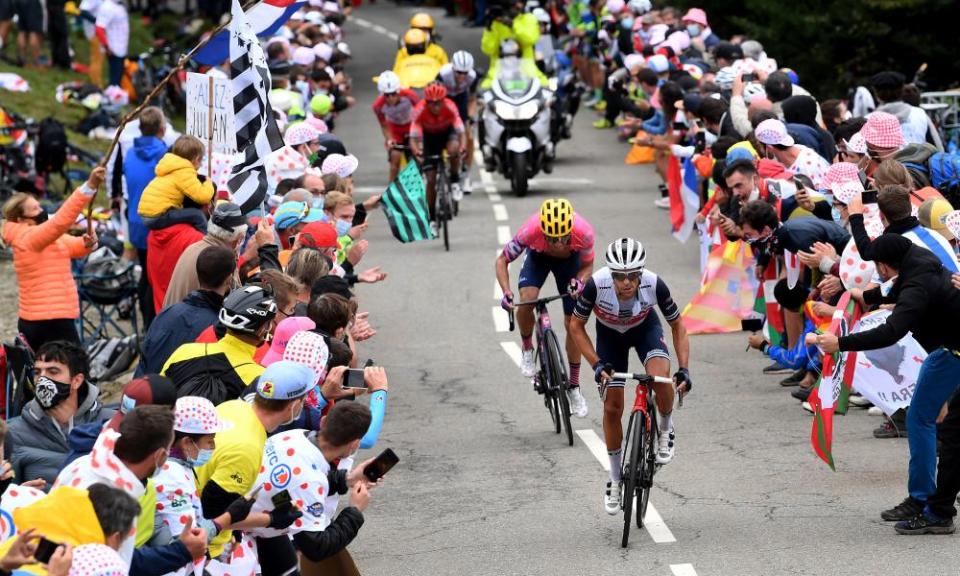Richie Porte sitting comfortably in absence of usual Tour de France noise

The ghost of Tour de France past still haunts Richie Porte, but the Australian is on track for a vintage campaign this year, entering the first rest day in the best position he has been in. The Trek-Segafredo rider crashed out of the 2017 and 2018 Tours on stage nine but cleared it and the Pyrenees without incident on Sunday . He now sits 11th overall – one minute and 53 second adrift of new race leader Primoz Roglic (Jumbo-Visma).
The 35-year-old stayed on the back of, but in touch with, a four-man group of title favourites, including Roglic, defending champion Egan Bernal (Ineos), stage winner Tadej Pogacar (UAE Emirates) and Mikel Landa (Bahrain-Merida) on the final climb, in an indication of form but more importantly, for him, composure. Porte lost touch cresting the summit into the descent of the Col de Marie Blanque though finished the stage closely behind in the second group.
Related: Tour de France: Primoz Roglic takes yellow from Yates as Pogacar wins
In terms of placement on the general classification at this point of the race, Porte is in the best position he has been in since leaving Sky (now Ineos) at the end of 2015 to become a yellow jersey contender, over super domestique.
“For me, it’s always nice to get through stage nine and into the first rest day fit and healthy,” Porte said post-race. “I’d like to have hung onto those guys at the top; it was just the last couple of hundred metres that I dropped it, but I don’t have that explosive power now in me. Anyway, [teammate] Bauke [Mollema] and I, we did a nice job I think to be in the second group. It was a good day, hard day. We co-operated well there, we had to, so look, it was a strong group in front as well.”
The Tour Down Under champion was caught out in crosswinds on stage seven and came in one minute and 21 seconds down on the same day, he later revealed, his wife gave birth to their second child, but has otherwise been with the frontrunners.
Porte finished the Tour 11th overall last season and was relieved to make Paris following two previous campaigns in which he sometimes struggled under a glaring media spotlight, perceiving press observations as attacks and allowing them to get to him. The race is as much a mental as physical battle and the best riders are sometimes the ones who do not let the noise get past their exterior.
Sticks, stones and words have hurt Porte before but that does not seem to be the case in this 107th edition, which he entered almost under the radar. That may prove, above all else, to work to his advantage and allow him to simply do what he is best at – race.
Porte took the lost time on stage seven in his stride and Trek-Segafredo, with co-captain Mollema, have punched above their weight given team selection was not entirely based around the pair.
“It’s far from ideal,” he had reflected after that. “But 1:20 is not going to be the deciding factor. Now we’re not so close on GC hopefully [we’ll] have a little bit more breathing space in the next stages.”
Porte, who has been linked with a move to Ineos in 2021, says this Tour will be his last as a team leader before he reverts to super domestique duties. He has downplayed his Tour expectations all season and in August said his aim was “trying to be on GC for as long as we can and then take it a day at a time”, rather than wear yellow.
And yet, the Tour and the UCI Road World Championships are his key objectives of the revised and condensed WorldTour season. Speaking in the lead-up to the postponed Tour – off the back of a near five-month shutdown due to the Covid-19 pandemic and only four weeks of race conditioning – Porte’s attention was always on what is yet to come: the third and final week, which is likely to determine the final podium.
Related: Adam Yates joins exalted company at Tour de France after years of toil | William Fotheringham
“The last week of the Tour is just so brutal … That’s not going to be losing seconds there that’s going to be losing minutes,” he said. “Without the racing, all the build-up races, yes, I think it’s going to be a bit of a death march to Paris to be honest.”
The peloton too is acutely aware of this and has kept some in reserve during the first third of the race, which, despite that, is shaping as the most evenly contested, man-to-man contest seen in the past decade.
The impact of the pandemic and the emergence of Jumbo-Visma as a GC powerhouse has perhaps contributed to the general change in pace and appearance of the Tour that Ineos has reigned over with a vice-like grip since 2012. Bernal is second overall, but Ineos is not the British empire, in Tour team culture or on-road presence, it once was.

 Yahoo Sport
Yahoo Sport 





































